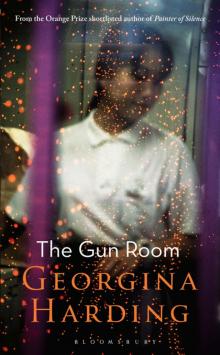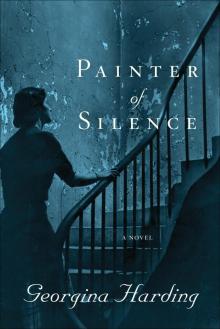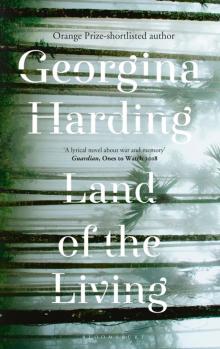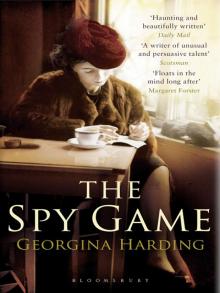- Home
- Georgina Harding
Land of the Living Page 4
Land of the Living Read online
Page 4
Yes, well, it’s disconcerting.
A doubt went through him. Was this where the story must always come to an end? Here in this farmhouse, against the sound of the dog drinking, muddy paw-prints across the kitchen floor. Because he had to tell it this way, didn’t he? Because that was what a chap did, wasn’t it, coming home, what chaps did who came home with this kind of story in them? Because he was Charlie, and that was the sort of person he was, at home, who made jokes and who made things matter-of-fact; the person she expected him to be, who must be matter-of-fact with her because she did not know that other man he might have been or might be inside. So pretty she was in this moment, just come indoors, looking fresh, laughing at what he said. She was filling the kettle, lifting the lid of the Aga, placing the kettle there to boil, a teapot to warm beside it.
When I first noticed the old women with black teeth I thought it was disease. Then I saw all the women had them. They make up some black jungle paste and smear it on.
Oh do they really? She spoke as if he was pulling her leg.
Smooth girls’ faces, dark eyes, so many black mouths giggling to see such a pale and hairy man. An old warrior with a necklace of brass heads pushing the girls aside, taking up his wrist in his hand, looking him over. He made some comment that caused the girls to howl and crease up with laughter, but all the time kept hold of his arm as if he was sizing up the flesh on his bones.
Tell it straight, he told himself. Take this moment, when there is such ease between you. Sit and tell the rest, over the kitchen table. You don’t have to meet her eyes. She doesn’t sit for long anyway, but gets up and leaves her tea unfinished and moves about, opening the fridge, deciding what she will make for supper. You watch her move, her hands, the back of her as she ties her apron. Put your own hand flat to the surface of the table, to the crisp yellow cotton of the cloth, smooth to the touch. And speak.
They looked after me. I must have fainted up there, after the climb, and they took me into a hut and cared for me until I was better. I don’t know how many days it was. At first I had a fever, then I was too weak to move. The hut was always dark. All the light in it came from the entrance, and from the fire they kept burning from morning to evening at the centre of the room. At that time of year in the rains there’s so little daylight anyway, there wasn’t so much difference, inside, between day and night. Their huts are big, long, barn-like, a single long room with sleeping areas partitioned off by screens of plaited bamboo. There’s the fire in the middle, no chimney but the smoke rising up through the thatch of the roof, and everything is permeated and sooty-black with the smoke.
The smell of smoke would cling to his skin and to everything he had. When he left the village the smell would go with him, and it stayed when he had washed and his clothes had been washed many times. Even now at home it came back to him at times. He would smell it in the ash and the half-burnt logs on the hearth when the fire was dead, or more powerfully when the rain had wet the remains of a bonfire, because always there had been dampness beside the smoke, but sometimes it would come to him unexpectedly in the bright dry open air as if any chance thought of the place carried the scent.
They must have been debating what to do with me that moment when I first got up to the village. I think that was why the men had come together in the circle. Someone had brought up the news from the fields, and the chief had called a meeting. I never again saw so many warriors together there. Later, when I’d recovered enough to wander about, those weeks before I left, I’d go to the circle, if it wasn’t raining, but I only ever met a handful of men up there at any one time.
I think they had already decided they would keep me until the rains ended and it was possible to travel. I think that it must have been a communal decision, though I lived with the family of the women who first found me.
Why, what for?
Just kindness, I suppose. Just, what people do.
And then he told her the simple things, how it was. How the family who took him in seemed to be quite an eminent family. They had a big hut with carved posts at the entrance, and wooden gable ends like horns standing out above the thatch.
I wish I had my sketches to show you. I tried to sketch it all later for Hussey, when I got to Hussey, the plan and style of the house, the carvings there and elsewhere in the village. I mapped out the village for him as well as I could. I had time to get to know the village well. It was spread along a smooth high shoulder of mountain with a cliff to one end of it and a steep, densely jungled peak to the other. The huts looked wonderfully shaggy with their palm-leaf thatch, perched wherever there was flat ground. Hussey says that the biggest huts are clan houses where the young men live and sleep. These have pillars with carvings, and huge log drums outside made out of whole tree trunks, and close to each of these huts there is always a circle like the one I first came to, constructed at some vantage point from which the men can watch for raiding parties from the surrounding valleys. These are all pretty much the same, levelled circles with stones a foot high set as seats around the edge, but that first one was the grandest, the sitting stones there carved like the village gate. I drew the design of the gate for Hussey, as well as I could remember it.
And I drew the weird things. I haven’t told you about those, have I?
No, you haven’t. Tell me the weird things. Claire paused in her cooking.
There was the head post. Close to that first circle, a grisly structure of poles hung with skulls, and around it a crowd of upright stones, menhirs as Hussey called them, that they put up to record headhunting raids.
Ugh, Charlie, human skulls?
Yes.
Not new ones surely?
I don’t know. Just skulls.
Here and there through the village were these groups of stones, about which they do wild dances, Hussey says, when there is a festival or a celebration, or when there has been a raid and there are new heads to string from the post. And there were the clan houses, which had those horns above their roofs and carved posts to their porches, and, outside and inside, more hanging skulls, some of them whole, some of them just the front and the upper part of the face, with the lower jaw removed, because that’s where the power in a head lies, in the front of the skull and the upper part, behind the eyes. According to what Hussey says, these halved skulls may have been brought from the most distant raids. When a raiding party has a long way to travel, they’re much easier to carry like that.
Well I hadn’t thought of that, Claire said, as she took out a knife from a drawer. Her voice was the crisp sort of voice she might have used to talk about a recipe or some little practical matter.
Of what?
Of how you carried skulls about.
Well, no, of course not. One wouldn’t, would one?
He saw that it was rather an odd thing to be speaking of. There were things that were too odd in her world to be spoken. That became no more than distractions when you said them like this, as if they didn’t matter.
She took the knife and she took a chopping board and placed them on the table. She went to the fridge to find in it whatever she meant to chop. He spoke to her back, to the curls in her hair, and her tidy waist about which he liked to put his hands, and the untidy apron string about it which he would have liked to untie.
All these things, he said, going on with the distractions, not saying what else he might have said but only the unnecessary things; these details, he said, were the sort of things Hussey wanted to know. You see, this was some place way out in the unadministered areas. Hussey had never been there. So far as he knew, no white man had ever set foot there before me. And I didn’t even know its name, or the name of its people or the language they spoke. The drawings and descriptions I gave him meant that he thought he could identify the tribal grouping, but there were elements that were unique, that made him wonder if they might have been some other tribe as yet entirely unrecorded. All I could bring him was whatever I could think to remember and a guess at the direction in which the plac
e lay, so many days’ walk east of Mokokchung. I had tried to keep at least an approximate notion of its location. I had my compass after all.
Sometimes for days on end there was no view because of the cloud and the rain. He would walk the narrow paths between the tawny brooding huts and the moving strands of mist to one of the viewing platforms, and squat on a stool that was too low for the length of his legs, and look out into nothingness, and some of the children who always followed wherever he walked in the village would cluster a little way off and watch him as he looked. Some days the cloud was so dense across the ridge that he scarcely saw even the children. Other days it massed below in a sullen grey sea. Once when the sky was clear he saw aeroplanes in the far distance. They were so far off that he could not have said whether they were Japanese fighters come to attack the British or British ones gone after the Japanese, or American bombers on their way to China.
We make love when you’ve been talking about your village. Do you notice that?
That’s only because it’s Sunday and we went for a walk, and we talked when we were on the walk. His voice came lightly as he lay on his back beside her in bed.
And then? She lifted herself up on an elbow, face close to his. She wanted him to look at her.
And then we came in. And we had tea, and then you had a bath. And when you came out from the bath you were warm and clean. And naked, of course.
Like they were in the village.
But they weren’t so clean.
I think you liked it there.
Yes, I told you, it was a Shangri-La.
But, darling, they were headhunters, not mystic Tibetans.
That’s not the point.
Why didn’t they let you go sooner?
Because of the rain at first. The rivers were all in spate. No one was going anywhere.
Didn’t you ever feel a prisoner?
No, actually, I don’t think I did. Except those days, and there could be days on end, when the rain wouldn’t stop, and then I felt a prisoner of the rain.
Oh.
Sometimes I felt I was a castaway.
Then would you have made a fire? Signalled from the beach for some ship to come?
He turned away from her onto his side, to face the window. That would have been hard. It was so wet, everything was wet and covered in mould. There were mushrooms growing in my boots.
Darling, don’t tease!
It’s true. I didn’t wear my boots for a while, and when I got to them again they were sprouting mushrooms.
She put her arm across him. You did like it there.
Yes, in a way. I did.
It had got dark while they were in bed.
We should draw the curtains.
She got up and stepped over his clothes on the floor and went to the window, pulling the curtains from the side just in case anyone was out there to see her. He hadn’t moved so she got back into the bed beside him where it was warm. He didn’t move then either, to welcome her back. He was still looking to where she had drawn the yellow curtains.
When the rains ended, did you leave then?
No, not then.
Why not?
I didn’t know where to go, did I? And it was very beautiful, after the rains.
So you just stayed there?
What else was I to do? And then one day a man turned up and led me away and I followed. He took me to Hussey.
Just like that.
No, not just like that. We walked for quite a few days, from one village to another. The man pretty much knew where he was taking me. When we got to a new village he always knew of someone there, and we went to that person’s hut. Hussey says they have alliances, individual connections they make so that men from one tribe can travel through another tribe’s territory. I don’t know if it was dangerous, if anyone might have hunted our heads. It didn’t seem so dangerous as when we were tracking the Japanese. But there was a place to stay in every village, and other men came to where we were and I think they told my man where to go. Once or twice a man from another village came with us some of the way as a guide. I think it’s possible that he didn’t even know about the war to start with, and certainly not where to find my people.
All she could see of him was the back of his head. Dark blond hair, a strong neck, his shoulder above the edge of the sheet. He seemed so far from her, just when she felt so close. If she could make him talk then perhaps it would bring them closer. Or perhaps this was just how it was and men always shut in on themselves after sex. She hadn’t the experience, she couldn’t have said.
It was so dark in those huts that if you had come in from outside you would have scarcely seen a thing. If you woke in one, slept and woke in one, lived in one all of the day, you didn’t think of it as dark any more. Only, that all colour was brown.
He had listened for some time before he opened his eyes. The sound was soft, mellow, the rain outside and inside the crackle of fire, the smooth talk of women shot through now and then by children’s voices, and all these sounds were already familiar to him, as if he had for some far longer time slipped in and out of listening, between sleep and consciousness, between the nightmare and this. Perhaps he had opened his eyes before, opened and closed them again as he woke and slept, because what he saw when he looked about him did not surprise him. No jungle any more, but this brown hut high above the jungle and above a valley cleared and claimed from the jungle. And in this hut, a hearth, women and children. A young woman squatted before a hearth. A small girl sat beside her with a smaller boy wriggling between her knees, a sturdy round-headed naked boy. Another woman crouched in the shadows behind where he could barely see but clearly hear that she was chopping something on a board. Somewhere out of his vision was an old woman crooning. The boy was the first to notice that he was awake, suddenly looking him in the eye and ceasing to wriggle, watching wide-eyed as he moved to sit up, as he lifted his head, as he took the weight of himself on his elbows; the two things, the stare of the boy and the heaviness of the pieces of his body, bringing him to awareness of his own objective presence, on a hard bamboo bed above the earth floor.
Upright, he could see better. Brown figures, black hair. The hut like an upturned ark. The smoke rising to the roof, to a coaly darkness webbed with soot. The woman at the hearth feeding a piece of branch deeper into the fire. The flames giving a glow to moving skin. He leant his back against a post in the flimsy bamboo wall. She sat sidelong to him so that he could not see her face but only the hair that was heavy and black, and fell forward as she bent to the fire. The boy, still watching him, held a puppy in his arms, but the puppy skipped out of them as a dog came forwards, a pale bitch with distended teats coming to hold the space between this woken stranger and her young. For there were other puppies, he saw, curled together in a mound close by the hearth.
He changed his position. He moved with more noise this time. He needed to exist somehow in all of this, to be recognised by someone other than the boy and the dog. Now they looked round. And at the same moment a baby in the shadows began to cry. Perhaps the sound had been there some time, it had begun as a mewling that he had not recognised at first as that of a child. And the woman from the shadows left off her chopping and took up the tiny baby and sat by the fire to feed it. He felt a kind of relief that it was that woman and not the other, though she looked scarcely any older. The one by the fire was the same girl-woman who had given him rice in the hut in the fields.
They spoke to each other and to him as if there were no language but their own. He understood only the laughter which he knew in their voices and in their eyes if not their smiles. Still he was afraid of the black smiles. They brought him drink, some bitter tea, and rice. Weakly, he bunched the rice in his fingers and began to eat. The children thought this very funny. What was funny? That a white man also ate? Or was it his table manners?
He ate, slept again, dreamt, woke. He was a joke, but perhaps the joke was other than he knew.
There was the constant underlying sound
of the fire, the almost constant sound of the rain on the thatch overhead, which varied only in its intensity, and there was laughter. The men running in, wet, shedding at the porch daos and rain shields and soaked blankets, wringing out the blankets, running comic and naked and shivering to the fire as the women moved away to give them space. The puppies scattering before the commotion. The shadow play of grotesques created by the flames as they built up the fire, gargoyle shadows cast by their extraordinary spiky headdresses, shadows that stilled and shrank as the men who made them settled, as they sat to drink rice beer, to fill their pipes, as they began to speak about him. He could see by their gestures that he was the subject of their talk. And they too laughed. They laughed a lot.
He didn’t laugh, not at first.
There were skulls hanging on the walls of the hut, and more skulls hung in what he could see of the entrance. They caught whatever light there was, yellow in the firelight, white in the mist-light at the porch, a sheen to bone such as there was to no other substance in the place. Those first days he would be aware all the time of the skulls looking down on him, pale bone and eye-sockets blacker than the women’s mouths.
Amazing that one day he would see them only as the ornaments to the house. What would Claire say to that? Let’s just run a line of skulls up here, beneath the cornice or along the passage. Or maybe a single one in the fanlight over the front door.
The rain fell harder. There was only a slender bamboo wall between him and the rain, streaming down the thatch, thrashing the ground outside.
She had gone downstairs. He got out of bed and picked up his clothes, went to run himself a bath. The bathroom was chilly and pale, the overhead light too bright. The water poured out loud onto the cast iron.
He bathed quickly as it wasn’t hot enough. Went down to join her.

 Harvest
Harvest The Gun Room
The Gun Room Painter of Silence
Painter of Silence Land of the Living
Land of the Living The Spy Game
The Spy Game The Solitude of Thomas Cave
The Solitude of Thomas Cave